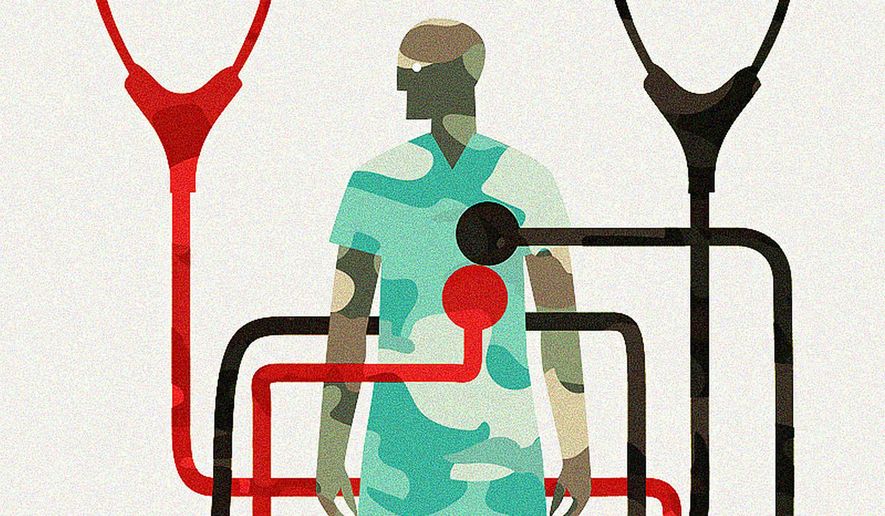OPINION:
As the former commander of the USS Cole, a guided missile destroyer that was attacked 11 months before the Sept. 11 attacks, I understand that our nation has a moral and legal obligation to care for our military service members who put their lives on the line to protect and defend America.
On Oct. 12, 2000, 17 sailors were killed and 37 wounded in Yemen, a nation again in the news for terrorism. This year, three U.S. soldiers were killed in Jordan by terrorists. Yet our government continues to fail to dedicate the necessary resources to give these American heroes adequate health care.
Our military forces deserve better, and those standing in the way are doing our nation a disservice. Finally, after many failed attempts, progress is slowly being made, only to have a handful of members of Congress block advances in technology that will help make our military healthier.
The least we can do as a nation is to provide decent health care to veterans and those serving today. The Department of Defense has made great strides, while the Department of Veterans Affairs is far behind in updating technology to provide adequate health care. Furthermore, some members of Congress are taking underhanded actions to undermine the VA’s mission to care for those in need by slowing the adoption of a more efficient method of sharing health records between agencies.
How we arrived at a situation where military health data is being stored and transmitted with 1980s technology is a case study in government dysfunction. The National Defense Authorization Act for fiscal 2008 contained a provision that required DoD and the VA “to accelerate the exchange of health information between the departments and to develop systems or capabilities that allow for full interoperability (generally, the ability of systems to use data that are exchanged).”
This system was required to be operational by Sept. 30, 2009. But according to a General Accounting Office report issued on March 12, 2009, “the departments have more to do: not all electronic health information is yet shared, and although VA’s health data are all captured electronically, information is still captured on paper at many DoD medical facilities.”
In plain English, this report indicated that the Defense and Veterans Affairs departments failed in the past.
After that effort failed without any accountability, DoD and the VA attempted in 2011 to create a joint integrated electronic health records system that was supposed to be rolled out in 2017. They spent over $1 billion, and this one also failed when the two departments pulled the plug in early 2013. Again, without any accountability.
At a hearing of the House Committee on Veterans’ Affairs, then-Chairman Jeff Miller argued that the announcement was a step backward toward “the model that had been previously tried and failed, namely maintaining two different systems between two different departments and wishfully thinking that the two systems will eventually talk to one another.”
The utter incompetence in updating health care information systems should not be tolerated.
The current effort to modernize the transmission of records using the VA’s electronic health record modernization program requires robust funding by taxpayers to provide veterans and those in service today with the best health care available.
The Captain James A. Lovell Federal Health Care Center is a great example of how to use a single federal electronic health recording system effectively across the Department of Veterans Affairs, the Department of Defense, the Coast Guard and others. While DoD has made valiant attempts to update the systems, the VA’s progress has been much slower.
Unfortunately, an unethical legislative agenda is being pushed by House members, including the Veterans’ Affairs Committee chairman, to terminate this program. If these members are successful, the VA will revert to something called the Veterans Health Information Systems and Technology Architecture, known as VISTA.
VISTA is a system deployed by the VA in the 1980s using an outdated system that fails by any measure in current software technology. Health care in the 21st century deserves 21st-century software that is flexible and adaptable, software that enhances health care professionals’ ability to care for our veterans. We cannot tolerate failure by accepting incomplete and inaccurate health records that endanger veterans and will lead to higher costs in the future.
It is common sense that the military must press forward with a modern, cloud-based health care system that will make compatibility between DoD and the VA a reality. The Department of Defense has made significant strides with implementing a modern electronic health records system, and more needs to be done at the Department of Veterans Affairs to catch up.
• Retired Navy Cmdr. Kirk S. Lippold is former commander of the USS Cole and author of the book “Front Burner: Al Qaeda’s Attack on the USS Cole.”




Please read our comment policy before commenting.